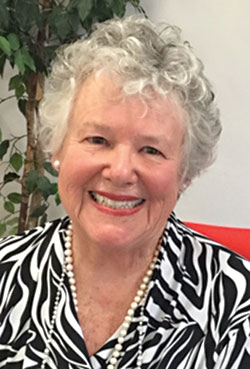
Urbanna, Va.— Historian Patrick Schroeder from the National Park Service at Appomattox, who specializes in the history of Lee’s surrender to Grant in April, 1865, presented an “edge of seat” program recently at the Historic Christ Church visitor’s center in Weems.
The program was sponsored by the Lancaster Branch of the Daughters of the Confederacy and shed light on the tragic suffering of both Yankee and Confederate soldiers as the war ended. I sat listening to the sad account as tears rolled down my cheeks. I was helpless to control my emotions.
Schroeder, author of several books on the surrender, was dressed in costume and appeared as Clerk of Court George Peers, who witnessed the last days of the war. His presentation included a map of Appomattox so we could follow all his movements from his house, the McLean House, courthouse, tavern and jail, which only added to our sense of actually being there.
Peers told us John Letcher, Governor of Virginia, first came on horseback on his way to escaping with the General Assembly to Lynchburg. In a fiery speech he told the poor people in town to stand up to the approaching Yankees before riding off to Lynchburg. At the time over 100,000 troops from both armies had surrounded Appomattox!
The two generals sent their envoys to arrange for a suitable place to meet. The McLean House was chosen, preparations were made and Lee rode into town on Traveler. Soon, Grant arrived with his contingency. A man traveling with him dressed in a rather odd looking Yankee uniform made out of black velvet turned out to be Robert Lincoln, the president’s son, who served on Grant’s staff.
Grant was a hard-nosed fighter but a kind and magnanimous man. He offered Lee’s Army of Northern Virginia generous terms for surrender. Confederate soldiers, some who had not eaten in days, were immediately fed and cared for and, with a promise not to fight any more, could keep their horses and go home to their families. After all, it was spring time and time to plant the crops.
Grant wanted the young nation so torn asunder to recover and become one again as rapidly as possible and this was the first step. Several days later Lee surrendered all the armies in the South to Grant to finally end the war.
One could almost feel the jubilation of Peers at the news the killing and horrible suffering were over. The young Republic must find other means to settle the issues of the day besides the barbarities of warfare.
The clerk recalled seeing a photographer arrive on the scene who took pictures of Yankee and Confederate soldiers together in front of the McLean House, their guns stacked against the fence (more tears). Copies of such photos can be purchased today at the visitor’s center.
Before McLean could reclaim his home, soldiers removed the two desks that each general had used while signing the surrender. McLean was paid $40 for one desk and $20 for the other. Everyone in town thought the price paid was exorbitant.
Schroeder’s description of what George Peers witnessed that week concurred with both Lee and Grant’s memoirs which I heartily recommend for a full understanding of that deadly four-year conflict. Both generals were extraordinary men, both cast of higher metal than most men, both basically tender-hearted and kind as they led their armies to the final close of the war. Both generals became god-like figures and were beloved icons to the soldiers they led.
We can’t learn enough of our history and the Daughters of the Confederacy are to be thanked for their constant devotion to presenting as much history on the Civil War as possible to today’s citizens.
I have always felt deep sadness and sympathy for both North and South in this heart-wrenching conflict. My ancestor who fought against Lee, Lt. George Grummond, who later died at Fetterman’s Massacre in Wyoming, had enlisted to “save the union.” Ohio had a special sentiment about Virginia because Ohio was once a part of the Commonwealth before the Northwest Territory was broken up into states. Ohio became a state in 1803. Ohio wasn’t about to lose its mother roots, if it could prevent it.
My husband said his great-grandfather, Capt. Samuel Napoleon Buxton, fought in the Confederacy to protect his homeland from Yankee invasion. It seems both ancestors had honorable ideals and fortunately (although Buxton was taken capture and held in a Yankee prison), they both survived the war.
It’s good to understand the passions of our ancestors. I am so grateful that our young Republic for which we love remained united. But, almost a million casualties—what sacrifice—yet the nation held. And, thanks to Lincoln, it also ended slavery, at least in America, a major step in the world of human progress.
©2019
 Note: Buxton’s new book, “Tripping,” available at the Sentinel office, humorously recalls “adjustments” she and her husband had to make in order to survive their 56-year “North-South” marriage.
Note: Buxton’s new book, “Tripping,” available at the Sentinel office, humorously recalls “adjustments” she and her husband had to make in order to survive their 56-year “North-South” marriage.



